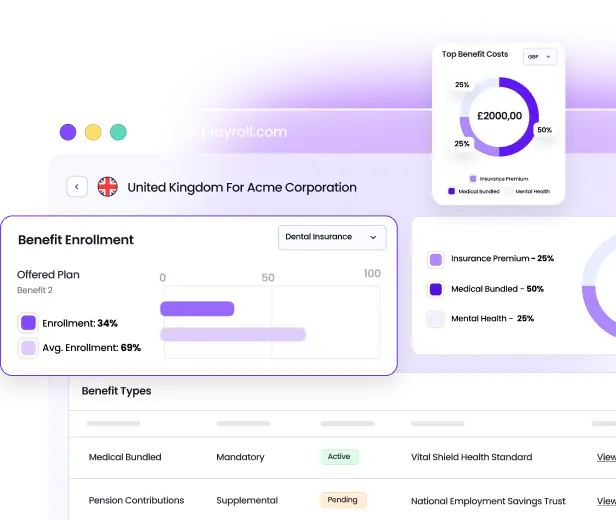Who Is Entitled to Employee Benefits In Japan
In Japan, employee benefits are primarily governed by labor laws that ensure the welfare of workers. All employees, regardless of their employment status—be it full-time, part-time, or temporary—are entitled to certain mandatory benefits. However, the extent of these benefits can vary based on factors such as the number of hours worked and the nature of employment contracts.
For instance, while full-time employees typically receive the full spectrum of benefits, part-time workers may have limited access depending on their working hours and specific agreements with their employers.
Overview of Employee Benefits In Japan
Japan's approach to employee benefits reflects its commitment to worker welfare and societal well-being. Compared to other countries, Japan offers comprehensive mandatory benefits, underscoring the importance of social security and health coverage in its workplace culture. Beyond the legally required benefits, many Japanese companies provide additional perks to enhance employee satisfaction and loyalty.
Mandatory Employee Benefits In Japan
Mandatory benefits are legally required and form the core of any employee benefits package in Japan. Here’s a comprehensive list of mandatory benefits in Japan:
Health Insurance
Japan mandates universal health coverage, ensuring all citizens and residents have access to medical services. Employers enroll their employees in health insurance programs, with premiums shared between employers and employees.
Pension Insurance
The Employees' Pension Insurance system in Japan offers income support to individuals post-retirement. Both employers and employees contribute to this system, which is crucial in a country with a rapidly aging population.
Unemployment Insurance
This benefit provides financial assistance to individuals who are unemployed through no fault of their own. Both employers and employees contribute to this insurance.
Workers' Accident Compensation Insurance
Designed to support workers who suffer from work-related injuries or illnesses, this insurance covers medical expenses and provides compensation during recovery periods.
Minimum Wage
Japan enforces a minimum wage law to protect low-income workers. The wage levels are determined based on the local cost of living and vary by region and industry.
Annual Paid Leave
Employees in Japan are entitled to paid annual leave, which increases with their length of service.
Maternity and Childcare Leave
Japanese law provides maternity leave for expectant mothers and childcare leave for parents.
Supplemental Employee Benefits In Japan
Supplemental benefits are not required by law, but can help you stand out as an employer and attract top talent. They include:
Housing Allowances
Some companies offer housing allowances to assist employees with living expenses.
Transportation Subsidies
Many employers provide transportation subsidies to ease commuting expenses.
Additional Health Screenings
Beyond mandatory health checks, some companies offer extra health screenings.
Company Recreational Activities
Organizing recreational activities fosters team building and improves morale.
Performance Bonuses
Many Japanese companies reward employees with performance-based bonuses.
Flexible Working Hours
To accommodate work-life balance, flexible work arrangements are offered.
Tax Implications of Employee Benefits in Japan
- Contributions to social insurance programs are shared between employers and employees, reducing taxable income.
- Housing allowances may be partially or fully exempt from tax.
How to Offer an Employee Benefits Program for Employees in Japan
Set Budget & Goals
Begin by defining clear objectives for your employee benefits program. For example, you might want to boost employee satisfaction, improve retention rates or attract top talent globally. Now, establish a realistic budget that aligns with these goals, taking into account the financial implications of offering various benefits across different regions.
Use tools like Playroll’s employee cost calculator to benchmark your offering across regions.
Partner with Benefits Providers
Collaborate with reputable global benefits providers who have proven experience in international markets. These partners can ensure compliance, and offer insights into local regulations, cultural expectations as well as competitive standards – making your benefits program more attractive to employees in each country.
Customize Benefits for Local Culture and Expectations
Employee needs and preferences can vary significantly across cultures. That’s why it’s so important to tailor your benefits offerings to reflect local customs, values, and expectations. For instance, while flexible work arrangements might be highly valued in one country, healthcare benefits could be more critical in another. Customizing your benefits packages accordingly can help make your offering more competitive to local talent.
Playroll’s benefits team provides expert insights into tailoring your benefits packages in 180+ regions to local needs, helping to attract and retain top talent.
Communicate the Benefits Program to Employees
Good communication is crucial to ensure employees understand and make use of the benefits available to them. Use appropriate messaging channels to inform employees about the program's details, how to access benefits, and any relevant procedures.
Encourage open lines of communication within the organization, and update the team on any changes in the benefits program. It’s a good idea to conduct regular employee engagement surveys to get feedback on satisfaction with your benefits program, to make proactive changes as needed.
Legal Considerations for Employee Benefits in Japan
Employers in Japan must navigate labor laws such as the Labor Standards Act, Equal Employment Opportunity Act, and Employment Insurance Act to ensure compliance.
How Benefits Impact Employee Cost
Employee benefits increase payroll costs but also improve retention and productivity. Employers manage costs by offering flexible benefits tailored to employee needs.
Disclaimer
THIS CONTENT IS FOR INFORMATIONAL PURPOSES ONLY AND DOES NOT CONSTITUTE LEGAL OR TAX ADVICE. You should always consult with and rely on your own legal and/or tax advisor(s). Playroll does not provide legal or tax advice. The information is general and not tailored to a specific company or workforce and does not reflect Playroll’s product delivery in any given jurisdiction. Playroll makes no representations or warranties concerning the accuracy, completeness, or timeliness of this information and shall have no liability arising out of or in connection with it, including any loss caused by use of, or reliance on, the information.
.svg)
.svg)
.svg)





.svg)



.png)












.webp)









.svg)